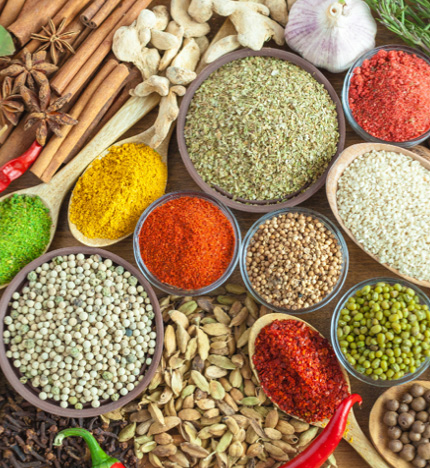Eat Your Herbs & Spices

(Let thy Food be thy Medicine: Research)
Herbology is one of the most significant branches of Traditional Chinese Medicine (TCM) that dates back to 200 B.C. Herbs and spices are traditionally categorized by their taste: pungent, sour, bitter, salty and sweet. Each of these tastes have a different effect on the body: pungent stimulates; sour consolidates; bitter drains; salty softens; sweet harmonizes. In recent years, research has shed additional light on the efficacy of popular herbs and spices to help with immune function and overall well-being. Food is truly medicine and here are some reasons that you should incorporate herbs and spices into your diet:
- Lower blood sugar levels;
- Cinnamon can help stabilize blood glucose and lipid levels
- Cinnamon is also used in TCM to treat the cold & flu symptoms
- Aid in digestion;
- Various spices such as ginger, cumin, peppermint, black pepper & turmeric have shown to stimulate bile acid and digestive enzymes
- Anti-inflammatory properties;
- Ginger, garlic and turmeric have all shown to aid with systemic inflammation
- Improve brain function and memory;
- Rosemary can aid with circulation and cognitive function
- Cinnamon is shown to help with reducing plaque build-up in the brain
- Nutrient-rich
- Herbs and spices like garlic, turmeric, parsley, basil and those previously mentioned contain:
- Antioxidants which help to prevent chronic disease and accelerated aging;
- Cardioprotective qualities by preventing tissue damage and inflammation;
- Anti-microbials that help to prevent infectious disease due to their antibacterial and antifungal properties;
- Phytochemicals which aid in immune function;
- Adaptogens which help with immune function and hormone balance to provide a healthy response to stress.
- Herbs and spices like garlic, turmeric, parsley, basil and those previously mentioned contain:



